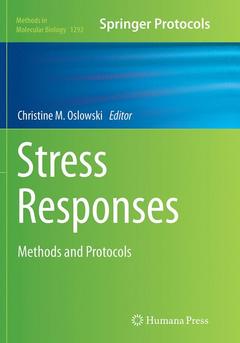Description
Stress Responses, Softcover reprint of the original 1st ed. 2015
Methods and Protocols
Methods in Molecular Biology Series, Vol. 1292
Coordinator: Oslowski Christine M.
Language: English
Subject for Stress Responses:
Support: Print on demand
246 p. · 17.8x25.4 cm · Hardback
Description
/li>Contents
/li>Biography
/li>Comment
/li>
This volume focuses on detecting different cellular stresses, measuring pathological consequences within the cell, and investigating the role of cellular stresses in select diseases. In addition, this book reviews the crosstalk between different stress pathways, stress responses during ageing, and targeting stress for regenerative medicine. Written in the highly successful Methods of Molecular Biology series format, chapters include introductions to their respective topics, lists of the necessary materials and reagents, step-by-step, readily reproducible laboratory protocols, and key tips on troubleshooting and avoiding known pitfalls.
Authoritative and instructive, Stress Responses: Methods and Protocols seeks to aid scientists to further study multiple stress pathways and outcomes triggered by such stresses. In depth knowledge of cellular stress will eventually lead to the development of novel therapeutics to prevent or treat related diseases.
Part I Assays for Detecting and Characterizing a Variety of Cellular Processes Under Cell Stress
1. Methods for Studying ER Stress and UPR Markers in Human Cells
Donna Kennedy, Afshin Samali, and Richard Jäger
2. Assays for Induction of the Unfolded Protein Response and Selective Activation of the Three Major Pathways
Ananya Gupta, Danielle E. Read, and Sanjeev Gupta
3. Assays to Characterize Molecular Chaperone Functions in vitro
Martin Haslbeck and Johannes Buchner
4. Analysis of Heat Shock Factor Complex in Mammalian HSP70 Promoter
Mitsuaki Fujimoto, Ryosuke Takii, Naoki Hayashida, and Akira Nakai
5. Immunofluorescence-Based Methods to Monitor DNA End Resection
Bipasha Mukherjee, Nozomi Tomimatsu, and Sandeep Burma
6. Visualizing the Spatiotemporal Dynamics of DNA Damage in Budding Yeast
Chihiro Horigome, Vincent Dion, Andrew Seeber, Lutz R. Gehlen,and Susan M. Gasser
7. Detecting Reactive Oxygen Species by Immunohistochemistry
Geou-Yarh Liou and Peter Storz
8. Investigating Inflammasome Activation Under Conditions of Cellular Stress and Injury
Clare Cunningham, Emma Corr, Donal Cox, and Aisling Dunne
9. Methods for Studying microRNA Functions During Stress
Yoshinari Ando and Anthony K. L. Leung
10. Measuring Autophagy in Stressed Cells
Marina N. Sharifi, Erin E. Mowers, Lauren E. Drake,and Kay F. Macleod
11. Detection of Apoptosis Using Fluorescent Probes
Grishma Khanal, Himali Somaweera, Meicong Dong, Todd Germain, Megan Ansari, and Dimitri Pappas
Part II Studying Cell Stress in the Context of Disease
12. Measuring Death of Pancreatic Beta Cells in Response to Stress and Cytotoxic T Cells
Jibran A. Wali, Prerak Trivedi, Thomas W. Kay,and Helen E. Thomas
13. Adaptation of the Secretory Pathway in Cancer Through IRE1 Signaling
Stéphanie Lhomond, Nestor Pallares, Kim Barroso, Kathleen Schmit, Nicolas Dejeans, Hélèna Fazli, Saïd Taouji, John B. Patterson, and Eric Chevet
14. Studying Nitrosative Stress in Parkinson's Disease
Kenny K. K. Chung
Part III Perspectives
15. Crosstalk Between ER Stress, Oxidative Stress, and Inflammation in Health and Disease
Aditya Dandekar, Roberto Mendez, and Kezhong Zhang
16. Stress Responses During Ageing: Molecular Pathways Regulating Protein Homeostasis
Emmanouil Kyriakakis, Andrea Princz, and Nektarios Tavernarakis
17. Targeting Stress Responses for Regenerative Medicine
Irina Milisav, Samo Ribarič, and Dušan Šuput
Includes cutting-edge methods and protocols
Provides step-by-step detail essential for reproducible results
Contains key notes and implementation advice from the experts




